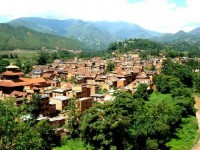Radio Sagarmatha
The first independent community radio in entire South Asia, Radio Sagarmatha was established in the year 1997. It goes on air from 5 am to 11 pm everyday from its studio in Lalitpur and has evolved as a truly independent and highly credible radio of Nepal.
Its program focuses on the entertainment information update and is a very common way of sharing information not only for one specific city or area but the whole country through the frequency 102.4 MHz and could also be heard online. It had to struggle for nearly a decade to get its license and there were many conditions to be followed, some of them being that it could not broadcast news and current affairs programs as well as economic agenda. Also the broadcast was allowed for two hours a day using 100 watt transmitter. However, it soon started talking the language of the people by breaking the monopoly of the government-owned radio and started its mission by giving voice to the people by respecting the right of the people to information while also giving them voice so that they could express their public opinions.
It also played an important role during the Free Independent Radio Movement before the year 2005 and it had successfully supported the cause of freedom of speech, rule of law, desired gender relations, human and women’s rights and role of youth in economic development throughout the past while the mission remains unchanged.
It has a wide range of coverage and although it broadcasts from Kathmandu valley, it frequency is available up to Sindhuli. It is available in districts like Makwanpur, parts of Chitwan, Dhading, Sindhuli, Nuwakot, Rasuwa, Sindhupalchowk, Dolakha and Ramechhap and also in parts of Solukhumbu and Okhaldhunga, Bara, Rautahat and Gorkha. Its regular listeners make around 2.5 million while it is available to 10 million listeners at times when its programs are relayed and re-broadcasted by local community radio stations throughout the country. It adopted the digital technology in the year 1999 and it was only after this that other radio stations turned to digital mode. Its initiative was supported by prestigious agencies like the UNESCO, SDC, DANIDA, ECO Himal, Community Radio Support Center (CRSC)/Free Voice, the Netherlands, Association of Community Radio Broadcasters Nepal (ACORAB), etc.
It was founded by Nepal Forum of Environmental Journalists (NEFEJ) in 1997 and apart from constituting the Board of Directors of Radio Sagarmatha, NEFEJ appoints its Station Manager and formulates its broad policy. The station manager also serves as a chief executive of the radio station. It has also built a network of community radio stations with the objective of revolutionizing community broadcasting. It has made its reach to the grassroots level with its network radio stations that add up to over fifty now. It is also a member of Association of Community Radio Broadcasters Nepal (ACORAB), Kathmandu Valley FM Broadcasters’ Forum and World Association of Community Radio Broadcasters (AMARC).
It has received the One World Special Award from One World 2007 of the United Kingdom which was awarded for working fearlessly and upholding the values and contributing to greater world understanding, AMARC International Solidarity Prize 2006 for fighting the royal regime during the Save Independent Radio Movement, Wash Media Award 2005 by the Wash Group which was jointly endowed by Who, Ministry of Health and Population, Ministry of Works and Physical Planning, UN-HABITAT, Water Aid, NEWAH and others. It has also been awarded by dozens of national agencies for carrying out advocacy on issues related to development, environment, public health and sanitation and the letters of appreciation from a number of agencies both governmental and non-governmental including from the Commission for the Investigation of the Abuse of Authority, Supreme Court of Nepal, Dalit Sewa Sangh, Loktantrik Press Club and Nepal Center for Disaster and many more.
Radio Sagarmatha is one of the most popular radio stations in Nepal which is also the pioneer in case of using the digital system of broadcasting.







